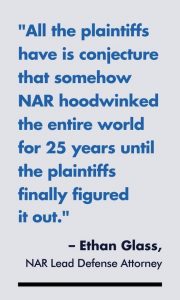KANSAS CITY—In a courtroom brimming with what appeared to be representatives of the class action suit, Burnett vs. the National Association of REALTORS® (NAR), opening statements got underway this morning, with lead attorneys for both the plaintiffs and the defendants forcefully laying the groundwork for their respective cases.
Aside from an approximately $1.8 billion settlement paid to those sellers who comprise the class members, on the line are sweeping changes to the way real estate professionals are compensated, and a possible elimination of the need for buyer’s agents in the U.S.

“I’m going to prove to you that defendants joined with the National Association of REALTORS® (NAR) in a conspiracy to follow and enforce rules increasing, inflating and stabilizing prices paid when you go to sell your house” and “return the housing market to fair competition,” Michael Ketchmark of Kansas-based Ketchmark & McCreight told the nine-person jury.
The instrument of the alleged conspiracy is NAR’s “participation rule,” which was used, said Ketchmark, to extract almost $7,000 each in unnecessary buyer’s agents commissions.
According to a trial brief filed on October 6, the “plaintiffs challenge overt anti-competitive restraints that have raised, inflated or stabilized residential real estate commissions throughout Missouri in violation of the federal antitrust laws.” The plaintiff’s case is largely focused on the participation rule, which they have referred to as the “Mandatory Offer of Compensation Rule.”
According to the plaintiffs, the rule was adopted by defendant NAR and “agreed and adhered to by corporate defendants,” Anywhere Real Estate., Homeservices of America, Inc., BHH Affiliates, LLC, HSF Affiliates, LLS RE/MAX, LLC, and Keller Williams Realty, Inc. Anywhere and RE/MAX have since settled the case, as well as a similar class-action suit filed in another jurisdiction.
Representing the plaintiffs, Rhonda Burnett, Ryan Hendrickson, Jerod Breit, Scott Trupiano, Jeremy Keel, Hollee Ellis, and Frances Harvey, “and all others similarly situated,” Ketchmark told the jury that “at the core of this case is the Sherman Federal Antitrust Act,” a more than 100-year-old law that governs what corporations can and can’t do.
According to data provided by Ketchmark and his team, 98% of the homes sold in Missouri during the timeframe in question (2015 – 2022), sold for between 2.5% – 3% in buyer commission, a clear indication of alleged price stabilization. “In a free marketplace, you’d expect differences in prices,” he said, adding that the defendants are “historically using a system to force this commission payment.”
RISMedia’s own 2023 Contract & Commission Study also found that commissions generally clump in that range, though it did not distinguish between buyer and seller.
Ketchmark enlisted carefully curated snippets of pre-recorded witness testimony from NAR CEO Bob Goldberg, Keller Williams Founder Gary Keller, HomeServices of America CEO Gino Blefari, RE/MAX CEO Nick Bailey, and SVP of Network Services for HSF Affiliates Rosalie Warner, in an apparent attempt to highlight gotcha-style deposition excerpts to jurors, in which brand executives appeared to support and recommend a 6% standard commission rule for the industry.
Defendants sought to limit the use of many of these excerpts right up until the day of the trial, with Judge Stephen R. Bough, who is presiding over the trial, eventually ruling the plaintiffs would be allowed to show and highlight these “volatile” moments of testimony.
Ketchmark referenced specific text from the companies’ policy manuals, training materials and presentations at live events, such as the KW Family Reunion, and shared an email from Gary Keller to a concerned agent which read, “the reality is, we can’t discuss commission and splits…we have to talk in concepts and hope that others know where we’re coming from.”
Additionally, Ketchmark pointed to NAR’s manual Navigating Legal Risks, which states that trade associations are a prime environment for “hatching conspiracies” since they hold information about all those who compete within a given industry.
Ketchmark also leaned into the increasingly predominant use of the Internet to search for a home, drawing an analogy to travel agents who, prior to the Internet, would charge up to 10% for their services, and now are virtually nonexistent. “72% of buyers find their home without using an agent,” he told the jury. “The Internet has made it much easier to shop for anything, and (NAR and the corporate defendants) know that and were worried about it.”
NAR defense presents logical path to debunking plaintiff’s claims
Representing the National Association of REALTORS®, lead defense attorney Ethan Glass with Washington D.C.-based law firm Cooley, where he serves as chair of its antitrust and competition practice group, used his opening statement to inform jurors about NAR, emphasizing right off the bat that it is a volunteer trade association. “I have nothing against companies and corporations, but NAR are the people on the ground.”
Glass also emphasized that homesellers are free to work with one of hundreds of thousands of real estate professionals who are not members of NAR and, therefore, not subject to its Code of Ethics and cooperation rules. “Not every real estate agent is a REALTOR®,” he said. “That label is only used by people who commit to the Code of Ethics, which are ethical standards that are public and known.”
According to Glass, the jury will be responsible for not falling prey to the plaintiff’s “shell game.”
“Grandma used to say, ‘follow the pea’,” he said, and in this case, “the pea is the (Mandatory Offer of Compensation Rule). We will show that NAR does not set commissions—NAR doesn’t even mention commissions. The rule has nothing to do with commissions. Everyone has the right to know how they’re going to get paid before they start working.”
“The rule reminds people of the unremarkable proposition that nobody works for free,” he later added.
Glass also cast doubt on the allegations of a conspiracy, saying that the rule has been public knowledge and in operation for more than two decades. “What kind of conspiracy is done out in the open? There isn’t one,” he said.
This same argument was used by those representing the REALTOR® community three-quarters of a century ago, when regulators first began scrutinizing price-fixing by REALTORS®.
Back in 1947, Washington D.C. Board of REALTORS® President Charles Rush, with his association under federal indictment, told local media that the case was “the first indictment for the violation of Federal antitrust statutes I have ever heard of where the allegations based on evidence so generally known, understood and appreciated by the public.”
Here in 2023, as organized real estate is facing similar accusations, Glass emphasized that NAR gives consumers a choice “all the way up until the time they sign the contract.” He asserted that the plaintiffs are in effect suggesting that buyers do not need to nor should work with an agent, and that they will use testimony from Australian real estate professionals to support the fact that buyer’s agents are unnecessary.
“By the mid ’90s, free market forces said buyers should have agents,” said Glass. “It wasn’t decided by NAR. NAR responded.” He later referred to the case as “a broadside attack on what NAR has done to help the free market.”
Glass additionally scoffed at the plaintiffs’ assertion that four corporations and 1.6 million local agents conspired to create price-fixed buyer agent commissions. “Everything NAR does is public,” he said. “All the plaintiffs have is conjecture that somehow NAR hoodwinked the entire world for 25 years until the plaintiffs finally figured it out.”
As emphasized in an Oct. 6 trial brief filed by NAR, the defendants continue to argue that “cooperation between agents to sell a home, and offers of compensation from one agent to the other are not evidence of a conspiracy.” The brief also cites the fact that NAR has a specific antitrust compliance policy, which disallows the kind of overt price fixing and collusion that the plaintiffs are trying to prove, including any effort to “fix, control, recommend, or suggest the commissions or fees charged for real estate brokerage services.”
“’Cooperation’ under NAR’s Code of Ethics is a defined term that simply means sharing the information about a listed property or making the listed property available to other agents to show to potential buyers,” said the brief.
Opening statements continued well into the afternoon from lead attorneys representing HomeServices of America, BHHS and Keller Williams. Taking place at the Federal District Court of Western Missouri, located in Kansas City, the trial is presided over by the Honorable Stephen R. Bough.
RISMedia is on location covering the trial in Kansas City. Stay tuned for ongoing updates.












